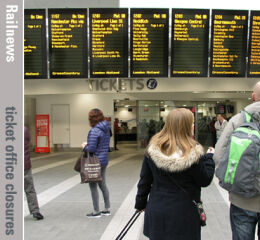Posted 27th July 2023 | 2 Comments
Now union challenges lawfulness of ticket office closures consultation

The legality of the consultation about closing the ticket offices at most stations in England has been challenged by the RMT union, which has called for ‘the whole disastrous closure programme to be abandoned’.
The union was reacting to the news that the original 21-day consultation period, which would have ended last night, is being extended to 1 September.
The transport watchdogs Transport Focus and London TravelWatch said they have already received more than 170,000 objections to the closures, and many Railnews readers have also voiced their opposition, often making the point that buying tickets will become more difficult, particularly for people with disabilities or those who do not possess smartphones or have access to the internet.
The Mayors in the city regions and some of their colleagues elsewhere had already been preparing to mount a legal challenge to the plans, which have been published by English train operators with Department for Transport contracts. Some critics have claimed that the closure programme has been devised by the Department, because it believes the closures would reduce railway costs.
The RMT says over 1,000 ticket offices are due to be closed with the loss of over 2,000 station staff. It is known that preliminary redundancy notices have already been served on the unions by train operators.
RMT general secretary Mick Lynch said: ‘Campaigning by our members on stations across the country alongside tenacious disabled peoples’ groups and passenger bodies has forced rail bosses and ministers to admit the original consultation was not fit for purpose and must be extended.
‘Although our pressure has forced their hand, it is still a deeply flawed and a wholly inadequate consultation process which we are considering challenging legally in the courts.
‘Our campaign to save ticket offices, protect our members’ jobs and look out for the best interests of all rail passengers will only intensify in the coming weeks.’
The RMT had already planned to stage another 24-hour walkout affecting most English train operators on Saturday in its dispute over pay and conditions, which now also includes a bid to keep ticket offices open.
Rail Delivery Group chief executive Jacqueline Starr said: ‘Train companies have listened to feedback, and are extending the time available to respond to the consultation on changes to how tickets are sold at stations to 1 September. Operators are keen to give more people a chance to give their views on the proposals, so they can bring the railway up to date with dramatic shifts in customer buying habits, while supporting all its customers as the railway evolves and adapts.
‘While local plans vary, the aim of the proposals is to bring staff out from behind ticket office windows to offer more help for customers buying tickets and navigating stations. At the same time ticket vending machines are being upgraded to offer a wider range of fares, and we have committed that no customer will have to go out of their way to buy a ticket.’
Reader Comments:
Views expressed in submitted comments are that of the author, and not necessarily shared by Railnews.

david C smith, Bletchley
Over a good few years now, DfT appear to have been working against any improving of passenger service , whilst putting more and more controls on the TOCs.
Just what might be the source for all this negativity, we probably will never know, but it does rather appear that the 1948 nationalisation was efectively
a takeover by Whitehall Government . Public ownership could take on the running of any part of the railway that is a natural monopoly ( local and commuter service, and infrastructure, for example), but would need to be less centralised , more able to adapt and to utilize direct democracy.
Neil Palmer, Waterloo
Ticket machines break down (or are vandalised). Along with the proposed ticket office closures the DfT is also pushing for removal of WiFi on trains (which will save an insignificant amount and just further alienate the customer base). Even amongst those with smartphones many depend on the WiFi on trains (foreign visitors not wanting to pay exorbitant roaming charges, those with limited data plans or over their monthly limit, or those using tablets with no data connection).
So the DfT's plans for closing ticket offices and removing WiFi will even make it more difficult for those with smartphones to purchase tickets in cases where ticket machines are out of service.
I find myself in rare agreement with Mick Lynch, it's not ticket offices that are no longer fit for purpose, it's the DfT.